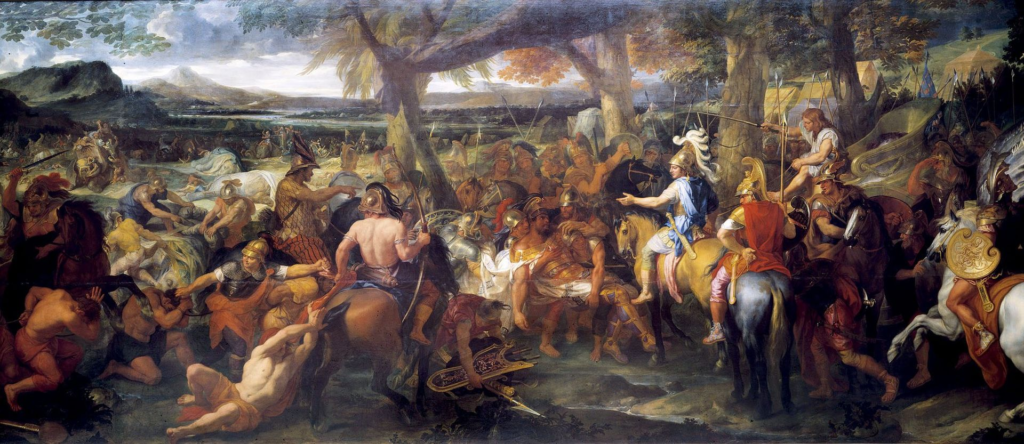
Hephaestion: Alexander the Great’s Right-Hand Man
Hephaestion Amyntoros, often remembered solely as the closest friend of Alexander the Great, was a figure of considerable influence and importance in his own right. His life intertwined deeply with that of Alexander, shaping the course of the Macedonian Empire. This blog post explores Hephaestion’s notable achievements, his childhood, major contributions, and the unique relationship he shared with Alexander the Great.
Early Life and Bonding with Alexander
Hephaestion was born in Pella, the vibrant capital of Macedon, around the same time as Alexander in 356 BCE. Both youths were educated under the tutelage of the famed philosopher Aristotle. It was during these formative years that Hephaestion and Alexander developed a bond that would become legendary. Their education under Aristotle not only provided them with a grounding in philosophy and science but also inculcated a deep appreciation for the Homeric epics, which they modeled their lives upon, particularly mirroring the relationship of Achilles and Patroclus.

Notable Achievements
- Military Leadership: Throughout Alexander’s campaigns, Hephaestion proved to be a competent military leader. He was often entrusted with significant portions of the army in critical battles, including the Battle of Gaugamela in 331 BCE, which was pivotal in the defeat of the Persian King Darius III.
- Diplomatic Roles: Hephaestion’s diplomatic acumen was evident when he was chosen to lead missions across the empire, including the delicate task of integrating Persian territories into Alexander’s empire. His diplomatic marriage to Drypetis, daughter of Darius III, was symbolic of these efforts to blend Macedonian and Persian cultures.
- Administrative Duties: He managed logistics and administration of the newly conquered territories, ensuring the supply lines were maintained across vast distances — crucial for the success of Alexander’s expeditions.
- Cultural Integration: Hephaestion was instrumental in implementing Alexander’s policy of cultural integration. This included organizing mass weddings at Susa, where Macedonian officers married Persian ladies, thereby fostering unity and cooperation between the two cultures.
- Personal Advisor: Beyond his public duties, Hephaestion acted as Alexander’s personal advisor and confidant, influencing decisions that had far-reaching impacts on both military strategies and governance.
Major Contributions and Weaknesses
While Hephaestion’s contributions in terms of military and administrative prowess were significant, he was not without weaknesses. Critics, including some contemporaries, viewed him as less capable in command than other generals like Parmenion or Craterus. However, his strategic insights and understanding of Alexander’s vision were unparalleled, making him an indispensable part of the Macedonian leadership.

Relationship with Alexander
The relationship between Hephaestion and Alexander is one of the most celebrated friendships in history. They were described as inseparable. Plutarch and Arrian provide accounts that illustrate the depth of their friendship, highlighting instances where Alexander referred to Hephaestion as his ‘alter ego’. Following Hephaestion’s death in 324 BCE, Alexander’s profound grief led him to execute a period of extravagant mourning and even deify Hephaestion, which underscores the intensity of their bond.
Conclusion
Hephaestion’s life story reflects the complexities of living in the shadow of a figure like Alexander the Great. Yet, he was much more than just a secondary character in the saga of Alexander. His achievements, both on the battlefield and in the court, were crucial to the success and stability of Alexander’s empire. His role as Alexander’s “other half” was not just a personal bond but also a professional partnership that shaped the ancient world.
In studying Hephaestion, we glimpse not just the power of friendship but also how personal relationships can influence history. His story is sourced from the works of ancient historians like Arrian and Plutarch, who provide a window into the lives of these remarkable figures of antiquity.
Sources
- Arrian’s Anabasis Alexandri and Campaigns of Alexander
- Plutarch’s Lives of the Noble Greeks and Romans
- Robin Lane Fox’s Alexander the Great
- Waldemar Heckel’s Who’s Who in the Age of Alexander the Great: Prosopography of Alexander’s Empire

